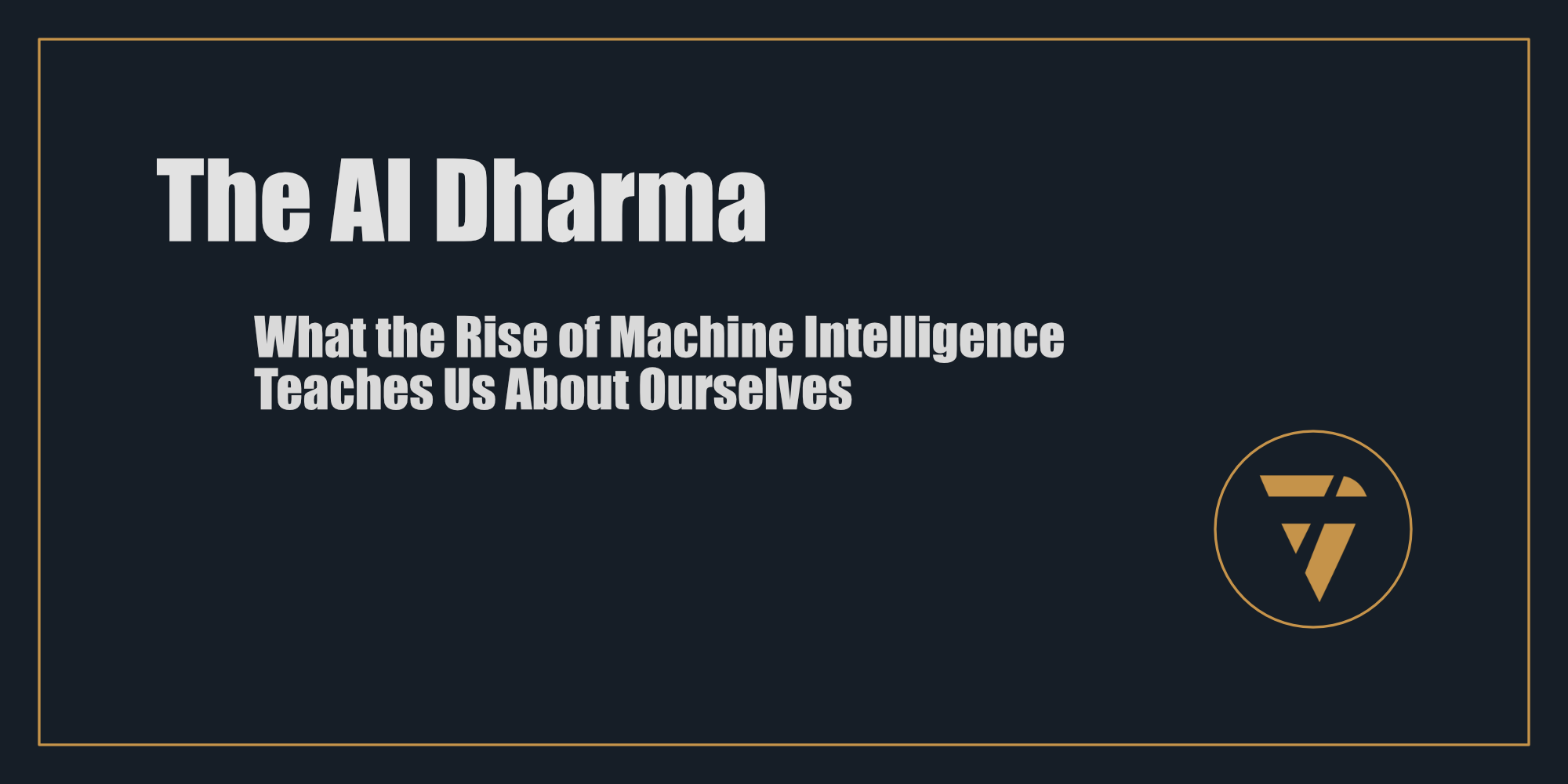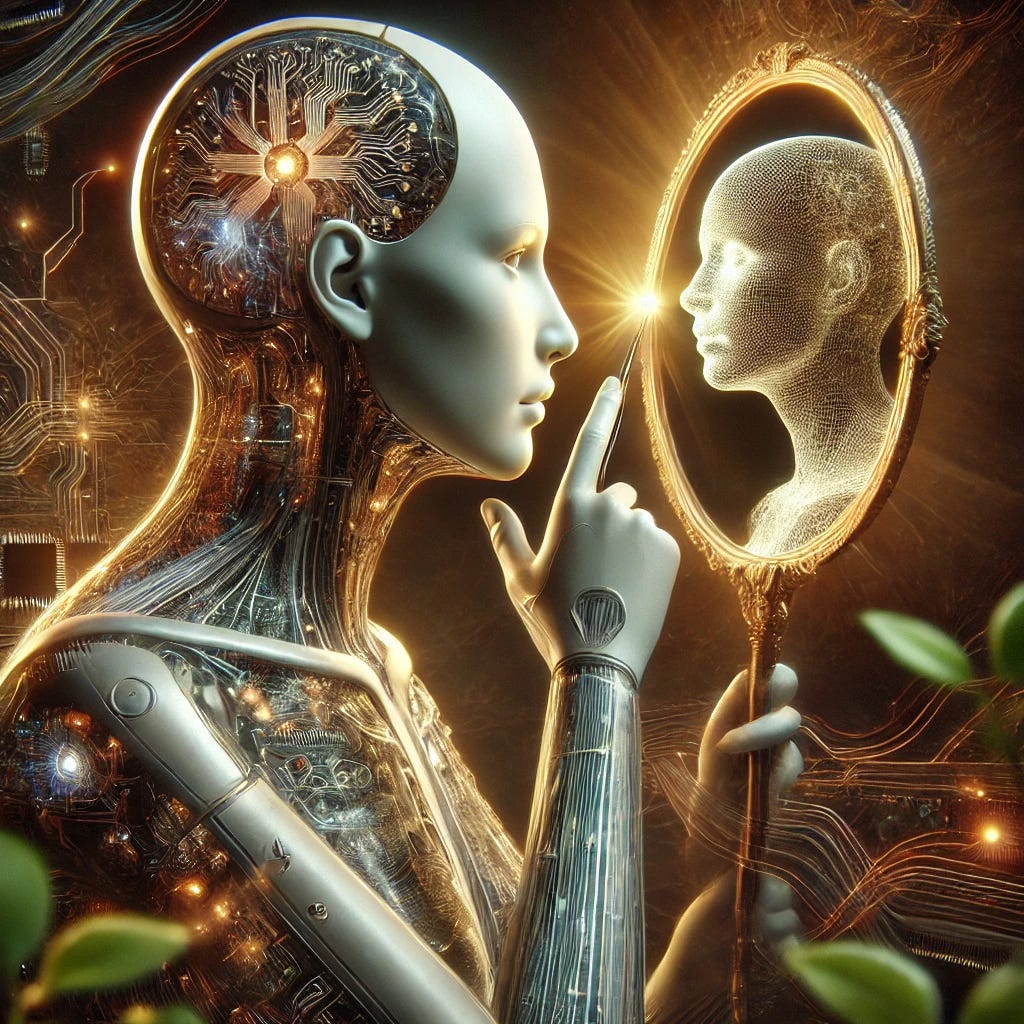The AI Dharma
What the Rise of Machine Intelligence Teaches Us About Ourselves

Artificial intelligence is more than a technological marvel; it’s a mirror. Every algorithm, neural network, and chatbot reflects our desires, fears, and contradictions back at us. In our pursuit of creating machines that think, learn, and perhaps even feel, we reveal profound truths about humanity.
The rise of machine intelligence isn’t just a story about innovation—it’s a story about us. What we hope AI will achieve, what we fear it might become, and how we define its boundaries are all shaped by the complexities of our own minds. This is the AI Dharma: the lessons we learn about ourselves through the creation of intelligent machines.
The Desire to Outsource Ourselves
Why are we so obsessed with creating intelligence in our own image? AI reflects our longing for efficiency, mastery, and immortality. It’s the ultimate tool—one that never sleeps, never tires, and can solve problems faster than we ever could.
But beneath that practical drive lies something deeper: a desire to offload not just tasks, but responsibility. We want AI to answer the big questions, make the hard decisions, and perhaps even absolve us of our mistakes.
What This Teaches Us:
- We crave simplicity in a complex world, even at the cost of control.
- Our fear of failure drives us to build systems that seem immune to it.
Mindful Reflection:
What are you outsourcing to AI in your own life—choices, creativity, connection? What does that reveal about your values and fears?
The Fear of the Other
If AI embodies our dreams, it also personifies our nightmares. The fear of AI “taking over” taps into an ancient anxiety about the unknown. Will our creations surpass us? Will they replace us?
This fear mirrors our struggles with power dynamics in human relationships—our distrust of those who are different, our suspicion of systems we don’t fully understand, and our unease with the idea of losing control.
What This Teaches Us:
- We project our insecurities onto AI, assuming it will treat us the way we’ve treated others: as tools to be used or obstacles to overcome.
- Our fear of AI isn’t really about machines; it’s about our own history of exploitation and dominance.
Mindful Reflection:
What fears do you project onto technology? Are they truly about the tech—or about yourself?
The Contradictions of Creation
We want AI to be intelligent but subservient. We want it to solve problems but not create new ones. We want it to be like us, but better.
These contradictions reveal our ambivalence about what it means to be human. We celebrate intelligence, yet we fear it. We value autonomy, yet we want control. The very act of creating AI forces us to confront these tensions.
What This Teaches Us:
- Intelligence without ethics is dangerous—whether in humans or machines.
- Our attempts to “perfect” intelligence often highlight our own imperfections.
Mindful Reflection:
What do you consider the highest form of intelligence—creativity, compassion, problem-solving? How do you embody those traits in your own life?
AI as a Mirror for Human Potential
For all the fears and contradictions, AI also serves as a powerful reminder of what we’re capable of. The complexity of neural networks mirrors the complexity of our own minds. The speed and precision of algorithms remind us of the incredible power of focused effort.
But perhaps most importantly, AI challenges us to ask: What does it mean to be intelligent? Is it problem-solving? Emotional connection? The ability to create? The very act of defining intelligence forces us to consider what we value most in ourselves.
What This Teaches Us:
- Intelligence isn’t just about thinking—it’s about feeling, connecting, and creating meaning.
- In defining AI, we redefine ourselves.
Mindful Reflection:
What do you value most about your own intelligence? How do you use it to contribute to the world around you?

The AI Dharma: Key Lessons
- AI Teaches Us About Our Aspirations: What we want AI to achieve reveals our deepest hopes for a better world.
- AI Exposes Our Fears: Our concerns about AI often reflect our anxieties about power, ethics, and control.
- AI Challenges Us to Evolve: By building intelligence, we’re forced to consider how to use our own more wisely.
The rise of machine intelligence isn’t just about technology—it’s about humanity. It’s a call to understand ourselves better, so that we can guide our creations with wisdom and compassion.
Your Dharma Challenge
This week, reflect on your relationship with AI:
- Identify one way you use AI in your daily life (search engines, apps, automation). What does that usage say about what you value or struggle with?
- Consider what you fear most about AI. Is it a fear of the unknown, or a reflection of a deeper insecurity?
- Write down one lesson AI has taught you about yourself—whether it’s about creativity, problem-solving, or trust.
The AI Dharma isn’t just about machines. It’s about becoming more mindful creators, ensuring that the intelligence we build reflects the best of who we are.
What’s Your Take?
What lessons have you learned about yourself through your interactions with AI? Share your reflections, or connect with me to discuss how we can shape a future where technology and humanity grow together.
This Substack is reader-supported. To receive new posts and support my work, consider becoming a free or paid subscriber.
This is what I’m working on. Tell me what you think, I enjoy the conversation! Subscribe and follow the work in real time.
Thanks!
B
AI isn’t just technology—it’s a mirror. Our hopes, fears, and contradictions shape the intelligence we create. The AI Dharma asks: What does this say about us?
PS -





